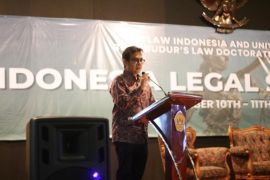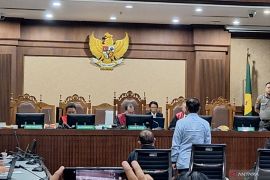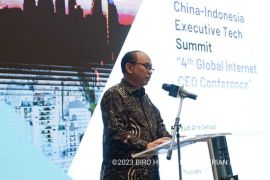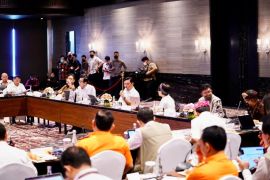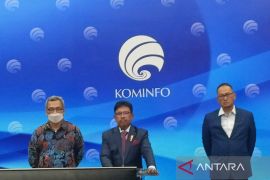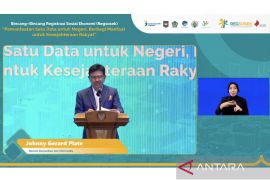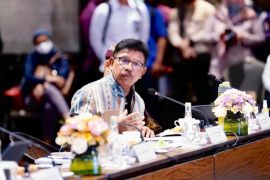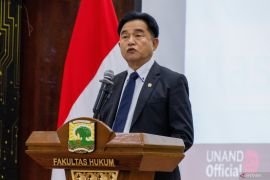This was conveyed by Plate while delivering a keynote address at the US-Indonesia Society Gala Dinner (USINDO) in Washington D.C., the United States, on Thursday (Feb 13).
"Undoubtedly, the world is now changing, from the physical to digital space, so Indonesia must prepare to transform itself in a digital era," Plate noted in a statement received in Jakarta, Friday (14/2).
"Indonesia has a very dynamic digital landscape, wherein currently, 171.2 million people actively use the internet and with 355.5 million cellular subscriptions. A total of 26 million SMEs are projected to go online in 2022," Plate stated.
On the same occasion, the minister pointed out that Indonesia, with a quite large digital market, is projected to emerge as one of the countries, with the highest economic growth, both regionally and globally.
Johnny affirmed that the government had four unicorns and one decacorn.
Moreover, at least eight startup companies are ready to become the next Indonesian unicorn.
The minister noted that these companies had grown extraordinarily into influential business companies, as they were currently generating employment and economic opportunities for Indonesia and entrepreneurs.
Furthermore, Johnny stressed that efforts to expedite the digital investment process are in line with President Joko Widodo's vision of creating a prosperous and sustainable Indonesia.
"A strong ICT ecosystem will create positive effects that will strengthen economic resilience and support the development of human resources," Plate stated.
The minister further expounded that large-scale development of ICT infrastructure in Indonesia had been conducted, undeniably on sustainable development by working with the private sector.
"We have built an over 348,000-km national optical fiber backbone, both land and submarine cables, and nearly 480,000 Base Transceiver Stations (BTS) throughout the country. In addition, five multi-functional satellites have orbits to cover the blank spots (3T region)," he stated.
The government has also developed 5G technology to stay abreast of the fast-moving global world.
Hence, the government remains proactive in ensuring that Indonesians remain connected to one another through the development of 5G technology.
"This is our priority, as we have a responsibility to meet the demand for the 737MHz spectrum by 2020 and will increase to 1,310 MHz before 2024," the minister revealed.
Meanwhile, the communication and informatics ministry plays a crucial role in the development of digital human resources, so it becomes a joint task to channel greater attention to boosting superior digital talent.
"We have the national movement for digital literacy. This movement has reached at least 75,000,000 people in the last two years," Plate stated.
"At a higher level of digital skills, this year, we have provided 60,000 slots of digital talent scholarship as well as 300 slots of digital leadership academy," he revealed.
Thousands of slots are also offered by our partners, such as CISCO, Google, Facebook, Microsoft, Amazon, IBM, Oracle, Huawei, and ZTE.
Furthermore, Plate highlighted the government's efforts to simplify regulations and policies in realizing the vision of Forward Indonesia, including the Draft Law on Personal Data Protection (UU PDP) and the Omnibus Law Bill that has currently been submitted to the Indonesian Parliament. Related news: Indonesia poised to become Southeast Asian giant in digital economy
Related news: Indonesia can become model of digital economic development for AIS
EDITED BY INE
Translator: Arindra, Azis Kurmala
Editor: Suharto
Copyright © ANTARA 2020


